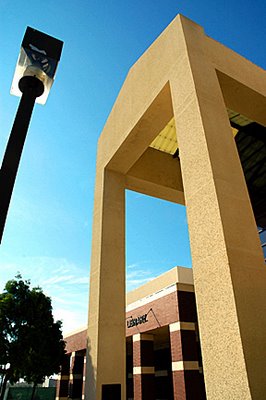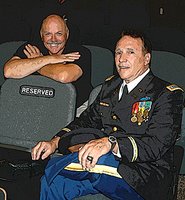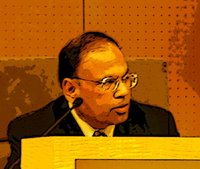
“I think that the drug war was a mistake.”
From The Drug War as a Socialist Enterprise by Milton FriedmanCONSIDERABLE TIME was devoted to exultation regarding Saddleback’s Gaucho football team, which is undefeated and headed for the state championship. Good for them. See Traci's highlights.
Norma Yanni came up to receive an honor (along with Lise Telson and Bob Cosgrove) re Best Practices in Student Equity, and this inspired Dave Lang to murmur insipidly that “we are certainly a board who believes in diversity as well.”
All seven of the trustees are Republicans. Some diversity.
During trustee reports, Bill Jay noted that there had been a groundbreaking for a “Business Sciences” building at IVC that very day. He took the opportunity to suggest that Saddleback College needs a stadium. This has become his hobbyhorse, though he shares this particular nag with John Williams. Bill mentioned Curt McLendon’s name, too. Something about a letter from Oregon. The Twilight Zone theme could be heard.
In his report, Don Wagner referred to the earlier announcement of the Gauchos’ success, noting, with customary peevishness, that the PE dean wasn't present. As you know, at the last board meeting, Wagner slapped the dean around a bit.
Tom Fuentes indicated that, later, he would have something important to say about “veterans.”
Nancy Padberg noted the passing of Milton Friedman, a champion, she said, of free enterprise and freedom. She requested that, when the meeting adjourns, it adjourn “in honor” of the F-man. I don’t see how that’s an honor. Besides, Milt would surely take a dim view of the board’s history of thwarting competition in favor of cronyism.
“One can only hope we can avoid being dubbed the Tammany Hall community college district.”
—Dave Lang, quoted in “College District Trustee alleges cronyism in college district.” Irvine World News, 6/22/00Dave Lang wanted to pay tribute, too, to Donna Martin, who will retire at the end of the year. That generated applause. Everybody likes Donna.
John Williams joined Bill in expressing the desirability of a stadium at Saddleback College. He said something about a recent event attended by a former Saddleback student and “Bond girl." —"Holly" something. "Gee whiz," he seemed to say.
When the time came for trustees to request reports, Tom Fuentes solemnly requested a look at “returning veterans.” I have no idea what he wants to do with them.
EFFECTIVENESS OF BOARD AGENDAS/MEETINGS
 Item 29 concerned “effectiveness of board agendas and meetings.” I’m not sure what this is about, but my guess is that Mathur’s “effectiveness” project was motivated by the following:
Item 29 concerned “effectiveness of board agendas and meetings.” I’m not sure what this is about, but my guess is that Mathur’s “effectiveness” project was motivated by the following: 1. John Williams' need for beauty sleep. For some time, the fellow has been clamoring for shorter meetings.Evidently, Raghu had prepared some sort of report or list of ideas regarding agendas, and that document was the focus of the discussion.
2. Chancellors are supposed to steer the board away from trouble and needless controversy. Chancellor Mathur eschews board steerage, although his innovations have occasionally sent the board over a cliff. I think the board wants Mathur to step up and take charge.
Nancy Padberg opined that some of the report’s ideas have not yet been “fleshed out by the board.” She seemed to favor fleshing before anything is adopted.
Nancy noted, too, that trustees still get the agenda too late (late Wednesday) to permit adequate study. Further, she seemed to imply that most or all of the innovations listed on the report came from one trustee whom she did not name. (Williams?)
Board Prez Dave Lang seemed miffed by that suggestion.
Williams, looking staunch, once again carped that the meetings go on too long.
Fuentes objected to the report’s suggestion to reorder the meetings, placing board reports last. That, he said, would diminish the role of the board, the taxpayer's representatives. He also opposed the notion of ceasing broadcast of the board meetings. It is “good and wholesome,” he said, to offer these broadcasts to the community.
Padberg agreed that the TV broadcasts are important. She seemed to say that one of the report’s suggestions—I think it was a rule prohibiting a sole trustee from pulling items from the consent calendar—“seems to be directed at me.” As you know, in the past, some trustees have complained that Nancy comes to meetings unprepared and that she wastes the board’s time with needless concerns. It’s hard to say what that’s really about with this crowd. Petty snipery, I think.
Wagner supported continuing the broadcasts and opposed the notion, evidently included in the report, that public comments should be strictly limited to two minutes.
Williams bloviated about the board’s occasional lengthy discussion of small expenditures. His concerns seemed somehow directed at Nancy Padberg, who retorted effectively with facial expressions: "You, sir, are an assh*le."
“Wild” Bill Jay announced that he never watches the TV broadcasts of board meetings, adding that “It’s tough enough living through it once!”
Padberg chimed in to say that “I don’t know what [the public] sees in [the broadcasts], but they do enjoy them.”
Eventually, trustee Fuentes reminisced about the beginning of his career. Back in 1970, he was some sort of assistant to the OC Board of Supervisors. (I believe that Fuentes worked closely with Supervisor Ronald Caspers, who ultimately disappeared mysteriously off the deck of a boat off the coast of Mexico.)

MATHUR'S COLA
Item 35 was “academic personnel actions,” including “cost-of-living adjustment [COLA], Chancellor.”
You’ll recall that, at the last meeting, Mathur attempted to sneak this item through using various ploys, including his failure to mention it during the “docket” meeting, when the Chancellor is supposed to preview the agenda. Oddly, the COLA item suddenly appeared on the agenda (with language that utterly obscured its nature) on the day of the board meeting. But his machinations were detected, and VC Bob King was instructed to properly agendize the item.
So, here it was again. Unsurprisingly, trustees Milchicker, Padberg, and Jay were opposed to granting Mathur a COLA—on the grounds that he is already extremely well paid—and trustees Williams, Wagner, Fuentes, and Lang supported the COLA on the grounds that, since other employees received a COLA, “fairness” demands that the Chancellor receive one, too.
Immediately, Padberg and Milchiker acted to “divide” the item, isolating the COLA as a separate item.
VC Gary Poertner made the “fairness” argument in favor of the COLA. But some trustees questioned that argument, noting that the chancellor has already received special treatment in other ways, as when the board granted him a huge chunk of money for his unused vacation days.
Williams held high an issue of the Chronicle of Higher Education, which, he said, contained an article about CEO salaries. (Evidently, Williams is not aware that the CHE is geared mostly to four-year institutions.) On the basis of the salaries indicated there, said Williams, Chancellor Mathur, who makes about $274K, is underpaid.
Poertner and the trustees engaged in a discussion concerning the actual size of Mathur’s salary and whether it is indeed the highest for a community college chancellor in the state. Evidently, to make that determination, many factors need to be taken into account (e.g., that some CEOs receive annuities), and so the question quickly seemed to become complex—and unsettled.
Williams expressed the worry that, if the board is not careful, the district will acquire an anti-CEO reputation!
Milchiker noted that advocates of the COLA were comparing Mathur with the Chancellor of the LA district, but that district comprises nine campuses, not two. Further, Mathur presides over far fewer faculty than do the other high-salaried Chancellors who had been brought into the comparison.
Wagner opined that it is “irrational” to treat one employee differently than others. He called the question. That passed. The board then voted. Mathur got his COLA.
●●●●●
Item 36 concerned “classified personnel actions.” In the course of the discussion, it was revealed that IVC Prez Glenn Roquemore’s father-in-law was among the classified employees affected by the action. (He works at IVC.) The item was approved.
Item 39 was a report, by VC Andreea Serban, on “Research and planning functions.” Her presentation was well received. Lang asked her if the district is doing all of the things that it should be doing with regard to research, etc. Serban explained that we need to be more “proactive.” But she seemed to say that we are now on the right track. She's very tactful.
Mathur went out of his way to heap praise upon Wagner and Lang’s questions to Serban. It was a classic instance of Brown Nosery. Deep brown.
STUDY ABROAD
 Item 40 was the “study abroad program” [sic]. In his introductory remarks, Mathur alluded to the “shrinkage” of the Study Abroad program owing to a “misunderstanding.” As it turns out, SOCCCD used to have 14 Study Abroad programs. Now it has two. The “misunderstanding” to which Mathur referred may have been the board’s unfortunate decision (or administrators' perception that such a decision had been made) to require unusually extensive insurance for these trips. That greatly increased trip costs and also narrowed the field of vendors. It has been disastrous.
Item 40 was the “study abroad program” [sic]. In his introductory remarks, Mathur alluded to the “shrinkage” of the Study Abroad program owing to a “misunderstanding.” As it turns out, SOCCCD used to have 14 Study Abroad programs. Now it has two. The “misunderstanding” to which Mathur referred may have been the board’s unfortunate decision (or administrators' perception that such a decision had been made) to require unusually extensive insurance for these trips. That greatly increased trip costs and also narrowed the field of vendors. It has been disastrous.(You’ll recall that, after the controversy caused by Fuentes’ rejection of the Santander, Spain trip partly on the basis of Spain’s pull-out from Iraq, Fuentes quickly distanced himself from that rationale and focused instead on issues regarding security and cost. The board then acted to increase the insurance. Or Mathur and Co. misunderstood the board's intent re changes in insurance, and the insurance was increased. Disastrously.)
Andreea Serban made a thorough presentation. She explained that SA programs are increasingly popular. She pointed out that most colleges carry $1-3 million in insurance, though $5-10 million is “appropriate.” As thing stand, the board requires $50 million. She offered some recommendations.
Wagner liked the report but noted that Serban seemed to be selling the idea of SA to the board. In fact, he said, the board supports SA. It’s just that these programs and trips should be “accessible," he said.
Fuentes again expressed his usual creepy concerns about minors going on these trips—16-year-olds who will end up sleeping in rooms with 18-year-olds. Plus these minors could get ahold of alcohol!
The notion was expressed that it was "unrealistic" to try to monitor students 24/7. Plus we can't stop 'em from boozing it up here at home either.
At the end of the meeting, the governance groups offered reports.
IVC student government Prez Rockwell Bower expressed concerns about security at the college. He noted that, recently, a student was found dead in his car (by his father, at 11 in the morning). Evidently, the student had been in the car, in the parking lot, through the night (he died at about 1:30 a.m.), and yet security had failed to investigate.
You might want to read the Lariat's November 21 issue. it includes an informative article entitled "Student dies on campus":
A 21-year-old IVC student was found dead in his car approximately 10 hours after his time of death Nov. 14, according to the OC Coroner's Office.
...The slow reaction time of the campus police has raised questions from student leaders as well as police.
...Saddleback chief of police Harry Parmer was...curious about the response time..."That's a little unusual that no one noticed the car there," said...Parmer..."Ten hours is a long time for the police officer to not patrol the parking lot."
...The time of death was approximately 1:30 a.m. Nov. 14....
 In the same issue, in an article entitled "Chancellor receives COLA raise," Mathur is quoted as saying:
In the same issue, in an article entitled "Chancellor receives COLA raise," Mathur is quoted as saying:"I think [my receiving the COLA] was only fair...You can't single out one employee when all other employees have been given COLA. This is common courtesy and practice."IVC's Bower is also quoted:
"I don't see the validity of giving a pay raise to the highest paid chancellor in the state in the third safest city in the nation with only two schools to manage."



